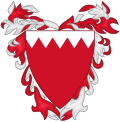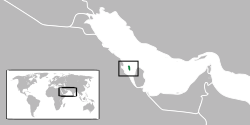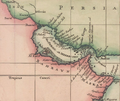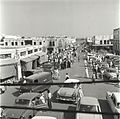Portal:Bahrain
The Bahrain Portal
Bahrain, officially the Kingdom of Bahrain, is an island country in West Asia. Situated on the Persian Gulf, it comprises a small archipelago of 50 natural islands and an additional 33 artificial islands, centered on Bahrain Island, which makes up around 83 percent of the country's landmass. Bahrain is situated between Qatar and the northeastern coast of Saudi Arabia, to which it is connected by the King Fahd Causeway. The population is 1,501,635 as of 2023, of whom 712,362 (47% of the population) are Bahraini nationals and 789,273 are expatriates spanning 2,000 ethnicities (53% of the population). Bahrain spans some 760 square kilometres (290 sq mi) and is the third-smallest nation in Asia after the Maldives and Singapore. The capital and largest city is Manama. According to archeologist Geoffrey Bibby, Bahrain is the site of the ancient Dilmun civilization. It has been famed since antiquity for its pearl fisheries, which were considered the best in the world into the 19th century. Bahrain was one of the earliest areas to be influenced by Islam, during the lifetime of Muhammad in 628. Following a period of Arab rule, Bahrain was ruled by the Portuguese Empire from 1521 until 1602, when they were expelled by Shah Abbas the Great of the Safavid Iran. In 1783, the Bani Utbah and allied tribes captured Bahrain from Nasr Al-Madhkur, and it has since been ruled by the Al Khalifa royal family, with Ahmed al Fateh as Bahrain's first hakim. In the late 19th century, following successive treaties with the British, Bahrain became a protectorate of the United Kingdom. In 1971, it declared independence. Formerly an emirate, Bahrain was declared a semi-constitutional monarchy in 2002, and Article 2 of the constitution made sharia a principal source for legislation. In 2011, the country experienced protests inspired by the regional Arab Spring. The ruling Sunni Muslim Al Khalifa royal family has been criticised for violating the human rights of groups including dissidents, political opposition figures, and its Shia Muslim population. Bahrain has been called one of the first post-oil economies in the Persian Gulf, the result of decades of investing in the banking and tourism sectors; many of the world's largest financial institutions have a presence in Manama. Oil revenues still constitute a significant part of its government budget. It is recognized by the World Bank as a high-income economy. Bahrain is a member of the United Nations, Non-Aligned Movement, Arab League, Organisation of Islamic Cooperation and the Gulf Cooperation Council. It is a Dialogue partner of the Shanghai Cooperation Organization. (Full article...) Selected article -The House of Khalifa (Arabic: آل خليفة, romanized: Āl Khalīfah) is the ruling family of the Kingdom of Bahrain. They profess Sunni Islam and belong to the Anizah tribe. Some members of this tribe joined the Utub alliance which migrated from Najd in central Arabia to Kuwait, then ruled all of Qatar, more specifically Al Zubarah, which they built and ruled over before settling in Bahrain in the early 17th century. The current head of the family is King Hamad bin Isa Al Khalifa, who became the Emir of Bahrain in 1999 and proclaimed himself King of Bahrain in 2002, in fact becoming a constitutional monarch. As of 2010, roughly half of the serving cabinet ministers of Bahrain were members of the Al Khalifa royal family, while the country's Prime Minister, Salman bin Hamad Al Khalifa, is also from the Al Khalifa family and is the son of the current King. (Full article...) Selected picture -Related portalsReligions in Bahrain Arab states Other countries Things to do
This is a Good article, an article that meets a core set of high editorial standards.
 The Bahrain health worker trials were a series of legal cases in which forty-eight doctors, nurses, and dentists faced charges for their actions during the Bahraini uprising of 2011. In September 2011, twenty of the health workers were convicted by a military court of felonies including "stockpiling weapons" and "plotting to overthrow the government". The remaining twenty-eight were charged with misdemeanors and tried separately. The following month, the felony sentences were overturned, and it was announced that the defendants would be retried by a civilian court. Retrials began in March 2012, but were postponed until June 14. Convictions against nine of the defendants were quashed and reduced against another nine. The Court of Cassation upheld the sentences against the remaining nine on 1 October. The case drew international attention and criticism, with organizations including the United Nations, the World Medical Association, Médecins Sans Frontières, the International Council of Nurses, Amnesty International, and Human Rights Watch expressing their concern over the health workers' military trials and sentences. An independent commission organized by the King of Bahrain concluded in November 2011 that many of the detained health workers had been subject to torture and abuse while in police detention. (Full article...) General images - Did you know -
More Did you know (auto-generated)
WikiProjectsTopics
CategoriesRecognized content
Featured articlesGood articles
Featured pictures
Associated WikimediaThe following Wikimedia Foundation sister projects provide more on this subject:
SourcesDiscover Wikipedia using portals
| |||||||||||||||||||||||||||||||||||||||||||||||||||||



























































































